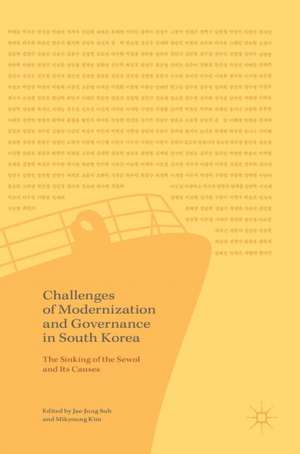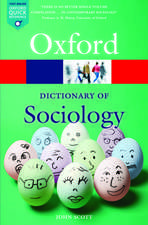Challenges of Modernization and Governance in South Korea: The Sinking of the Sewol and Its Causes
Editat de Jae-Jung Suh, Mikyoung Kimen Limba Engleză Hardback – 10 aug 2017
| Toate formatele și edițiile | Preț | Express |
|---|---|---|
| Paperback (1) | 579.67 lei 6-8 săpt. | |
| Springer Nature Singapore – 11 dec 2018 | 579.67 lei 6-8 săpt. | |
| Hardback (1) | 641.53 lei 6-8 săpt. | |
| Springer Nature Singapore – 10 aug 2017 | 641.53 lei 6-8 săpt. |
Preț: 641.53 lei
Preț vechi: 754.74 lei
-15% Nou
Puncte Express: 962
Preț estimativ în valută:
122.75€ • 128.51$ • 101.57£
122.75€ • 128.51$ • 101.57£
Carte tipărită la comandă
Livrare economică 05-19 aprilie
Preluare comenzi: 021 569.72.76
Specificații
ISBN-13: 9789811040221
ISBN-10: 9811040222
Pagini: 233
Ilustrații: XVII, 227 p. 5 illus.
Dimensiuni: 148 x 210 x 22 mm
Greutate: 0.45 kg
Ediția:1st ed. 2017
Editura: Springer Nature Singapore
Colecția Palgrave Macmillan
Locul publicării:Singapore, Singapore
ISBN-10: 9811040222
Pagini: 233
Ilustrații: XVII, 227 p. 5 illus.
Dimensiuni: 148 x 210 x 22 mm
Greutate: 0.45 kg
Ediția:1st ed. 2017
Editura: Springer Nature Singapore
Colecția Palgrave Macmillan
Locul publicării:Singapore, Singapore
Cuprins
Introduction: Sinking the Sewol, Drowning Korea? Compressed Modernization and Compounded Risks.- The Sewol Disaster: Predictable Consequences of Neoliberal Deregulation.- Institutionalized Irresponsibility: Understanding the Sewol Disaster from the Perspective of the Addictive Organization Theory.- National Crisis and Democratic Consolidation in South Korea.- Capturing Collusion: The Industry and the Government in Ferry Safety Regulation.- “Stay Still”: Sewol, a Tale of Fatal Censorship, Fatal Paternalism.- Disciplining High School Students and Molding Their Subjectivity in South Korea: a Shift in Disciplinary Paradigm.- Foreign to Disaster or New Point of Solidarity? A Vietnamese Victim Family in the Sewol Aftermaths.- From Passive Citizens to Resistant Subjects: The Sewol Families Stand Up to the State.- Epilogue: The Wreck of the Sewol.
Notă biografică
Jae-Jung Suh is Professor at the International Christian University in Tokyo, Japan. He has served as Associate Professor and Director of Korea Studies at SAIS, Johns Hopkins University and Assistant Professor in Department of Government at Cornell University as well as on the Presidential Commission on Policy Planning (Republic of Korea).
Mikyoung Kim is International PoliticalScience Association (IPSA) Chair of Human Rights Research Committee. She has published many refereed articles and book chapters on memory, reconciliation, and human rights in East Asia. She was a two-term member of ROK National Unification Advisory Council (2012-15).
Mikyoung Kim is International PoliticalScience Association (IPSA) Chair of Human Rights Research Committee. She has published many refereed articles and book chapters on memory, reconciliation, and human rights in East Asia. She was a two-term member of ROK National Unification Advisory Council (2012-15).
Textul de pe ultima copertă
Focusing on the sinking of the Sewol, a commercial ferry which capsized off the South Korean coast in April 2014, this book considers key issues of disaster, governance, civil society and the ideational transformation of human agents and their empowerment. Providing a lens through which to re-examine South Korean institutions, laws and practices, the volume examines the impact of the Sewol incident and what it reveals about the fault lines of South Korean society and governance. It addresses the repercussions of South Korea’s turn to a liberal democracy and neoliberal economy and reflects on the multilayered implications of the disaster in respect to the potential human costs of the country’s state-driven development policy and high stress modernisation. The book also highlights the relevance of the Korean experience for other societies on a similar developmental trajectories and facing similar challenges.
Caracteristici
Addresses the key issues of disaster and governance in an East Asian society, through the lens of a revealing an recent case study, the Sewol incident Considers how fast track political and economic modernization has impacted on governance and civil society in South Korea Highlights the relevance of the Sewol incident beyond South Korea’s borders, particularly for other societies on fast development tracks and facing similar challenges Includes supplementary material: sn.pub/extras














